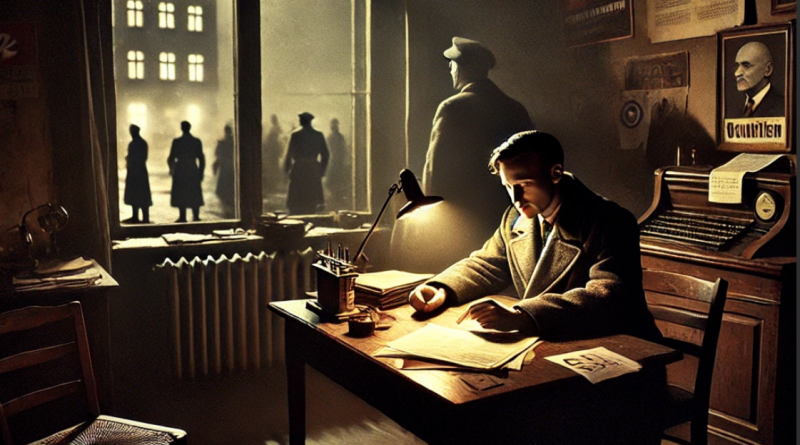The Last Abstention
In the dim light of a late winter evening, March 5th, 1933, Hermann Vogel sat at his kitchen table in Berlin, the ballot paper in front of him still untouched. The nation was holding what might be its final free election, but Hermann, a lifelong socialist, was unsure if he could bring himself to participate. His disillusionment with the Social Democratic Party (SPD) had grown over the years, especially after what had happened in 1919—an event that shaped his entire political worldview.
Hermann had been a witness to the Spartacist Uprising of January 1919, a time when revolution seemed within reach. He had marched through the streets with other workers, united by a dream of a socialist future. But that dream had been crushed—violently. Under the leadership of Friedrich Ebert and Gustav Noske, the SPD had called upon the right-wing Freikorps militias to suppress the uprising. Hermann could still recall the bitter taste in his mouth when the Freikorps killed Rosa Luxemburg and Karl Liebknecht, icons of the revolutionary movement. The SPD’s betrayal was seared into his memory, a party that, in his view, had abandoned the socialist cause to maintain its grip on power.
Since then, Hermann had watched the SPD drift toward centrism and compromise. They had propped up the Weimar Republic, an unstable system that seemed to bend over backward for the capitalists while leaving the working class to suffer through economic hardship. The party that had once stood for socialism now seemed more focused on preserving the status quo, and Hermann, along with many others in the Socialist Workers’ Party (SAPD), saw the SPD as complicit in the failures of the republic.
Now, in 1933, the stakes had never been higher. The far-right was rising. The Nazis had already been gaining power, with Adolf Hitler recently appointed Chancellor. The Reichstag Fire of February 27 had given them the pretext to pass the Reichstag Fire Decree, effectively eliminating civil liberties and allowing the Nazis to arrest their political enemies with impunity. Everyone knew that this election could be Germany’s last chance at democracy, and yet Hermann still hesitated.
As he stared at the SPD ballot on the table, his mind replayed the SPD’s actions over the years. Yes, they warned of the Nazi threat, but weren’t they the same party that had betrayed socialists before? Weren’t they the ones who, time and again, chose stability over true progress? Voting for them felt like endorsing a betrayal he couldn’t forgive, even in the face of a greater threat. And the Communist Party (KPD), though ideologically closer to his views, was paralyzed by its infighting and blind loyalty to Moscow’s directives, making a united front impossible.
He considered simply abstaining. After all, the SPD had abandoned him, just as they had abandoned Luxemburg and Liebknecht years before. Why should he throw his support behind a party that had repeatedly failed the left? Why compromise his ideals for a system that had never truly represented the working class?
But there was another voice in his head, quieter but insistent. The Nazis were not just another party—they were a different kind of threat. They had already begun dismantling democratic institutions, and should they win a decisive victory, the future would be darker than anything Hermann could imagine. Voting for the SPD wouldn’t be an endorsement of their failures, he reasoned, but rather a way to block something far worse. Yet, the bitterness over the SPD’s past actions gnawed at him. Could he really support them after all they had done?
As he wrestled with his decision, the atmosphere outside was growing more dangerous. Nazi brownshirts patrolled the streets, intimidating voters who appeared sympathetic to leftist parties. There were rumors of ballots being monitored, and Hermann knew that abstaining or voting for the KPD might draw unwanted attention. Yet, the pressure didn’t push him toward action—it deepened his resolve. The SPD, in his mind, had created this situation by repeatedly failing to act when it mattered most.
The clock ticked closer to the election deadline. Hermann could hear the distant chants of Nazi supporters, a reminder of the rising tide that threatened to wash away everything. Despite this, he folded the SPD ballot paper and set it aside, unmarked. He wouldn’t participate. Not for a party that had compromised its values, no matter how dire the situation. His abstention, he reasoned, was a statement—a refusal to endorse a party that had betrayed its own.
The election came and went. The Nazis, with their coalition partners, won enough seats to secure a majority. Within weeks, Hitler would use his newfound power to pass the Enabling Act, granting himself dictatorial authority. The SPD would be banned, its leaders imprisoned or exiled, and the KPD effectively destroyed.
As the country descended into fascism, Hermann could not help but reflect on his decision. The Nazi threat had been real, and his refusal to vote for the SPD might have contributed, however minutely, to their rise. But the question that lingered in his mind, even as the regime tightened its grip, was whether his moral stance had been worth the price. Had his abstention, his refusal to compromise, been the right choice in the face of such overwhelming evil?
For years to come, Hermann would ask himself if there had been another way—a way to resist fascism without endorsing a party that had already proven itself willing to betray the left. He never found an answer.
Nearly a century later, Hermann’s story carries an unsettling relevance. As the 2024 U.S. Presidential election approaches, the left finds itself facing a similar dilemma. Kamala Harris is not a perfect candidate—far from it. The Biden/Harris administration’s complicity in Israel’s actions in Gaza has enraged many on the American left, particularly those who see the devastation in Gaza as an unforgivable humanitarian crisis. Progressives feel betrayed, just as Hermann felt betrayed by the SPD in 1933. The sense of abandonment is real, and the frustration with the Democratic Party’s centrist tendencies is palpable.
But there is another threat looming in 2024: Donald Trump and the forces behind Project 2025. Trump has already shown authoritarian tendencies during his time in office. He refused to concede the 2020 election, stoked false claims of voter fraud, and attempted to overturn a legitimate democratic process. His supporters stormed the U.S. Capitol on January 6, 2021, in an unprecedented attack on American democracy. Since then, Trump has only grown more emboldened, promising to root out his political enemies and take control of federal agencies to cement his power.
Project 2025, a blueprint for reshaping the U.S. government under Trump, threatens to dismantle democratic institutions further. It advocates for the president to gain sweeping authority over the judiciary, law enforcement, and civil service, turning these institutions into instruments of power rather than checks on it. Trump’s repeated attacks on the press, his praise of authoritarian leaders abroad, and his attempts to undermine democratic elections all point to a chilling future if he regains power.
Like Hermann in 1933, today’s leftists are faced with an agonizing choice. They can abstain from voting, refusing to support an administration they see as complicit in foreign atrocities. But in doing so, they risk allowing an anti-democratic force far more dangerous than the Democrats to take control.
Hermann’s refusal to vote didn’t prevent the rise of the Nazis—it only helped them. And while today’s situation is different in many ways, the lesson remains the same: letting the far-right dismantle democracy won’t help anyone, least of all those who suffer from war and oppression. The fight for justice is long and hard, but abandoning the field to fascists and authoritarians is never the answer.

